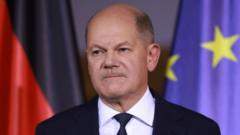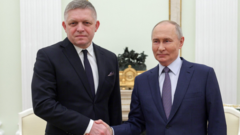This article delves into the recent upheaval within Germany’s government, exploring the implications of the coalition breakdown and the ensuing calls for elections.
Germany Faces Political Turmoil as Scholz's Coalition Disintegrates

Germany Faces Political Turmoil as Scholz's Coalition Disintegrates
Germany's political landscape shifts dramatically as Chancellor Scholz's coalition faces collapse.
Germany is currently navigating a profound political crisis as Chancellor Olaf Scholz's coalition government has imploded, showcasing the complexities of intra-coalition rivalries and constitutional dilemmas. With the specter of economic stagnation hanging over Europe’s leading economy and uncertainties stemming from possible shifts in U.S. political dynamics, the situation in Berlin is increasingly precarious.
The turmoil reached a pivotal moment on Wednesday when Scholz dismissed Finance Minister Christian Lindner, the head of one of the coalition’s three parties. This dramatic move resulted in the resignation of two other cabinet colleagues, effectively shattering the coalition. As a result, Scholz now leads a minority government and must seek cooperation from opposition parties to pass essential legislation, including the critical 2025 budget scheduled for discussion next week.
In the face of financial aid requirements for Ukraine and proposals aimed at bolstering defense spending, Scholz's lack of a parliamentary majority complicates his agenda. He has reached out to opposition leader Friedrich Merz to garner support for key policies, despite previous tensions. Merz, a prominent conservative figure, has called for immediate action, demanding a vote of confidence and snap elections due to his concerns over Germany's ability to function effectively amid political instability.
The coalition's hasty unraveling has raised alarms not only domestically but also across Europe. Annalena Baerbock, the Foreign Minister, remarked that this development bodes poorly for both Germany and the European Union. Scholz's desire to hold a confidence vote on January 15 with subsequent elections scheduled for March is mired in contention, as opposition parties echo Merz's call for an immediate resolution to the impasse.
At the intersection of fiscal policy and political strategy, the coalition's fracturing reflected deep ideological divides. Scholz and the Greens advocate for investing in infrastructure and renewable energy by allowing new debt, while Lindner's liberal FDP faction opposes such measures, prioritizing austerity and tax reductions. The failure of recent negotiations highlighted their irreconcilable differences, culminating in Scholz’s public denunciation of Lindner as irresponsible and self-serving.
While some allies of Scholz previously urged against early elections, the growing disdain among voters for ongoing coalition disputes, along with the rising influence of far-right and populist parties, has catalyzed calls for change. Polling indicates a substantial lead for conservative parties, with the far-right Alternative for Germany (AfD) gaining traction as discontent grows among voters regarding the current government's effectiveness.
The backdrop of impending shifts in U.S. leadership adds another layer of urgency to Germany's precarious situation. A potential leadership change in the U.S. could upset existing financial support channels for Ukraine and challenge national security policies. As such, many analysts assert that the need for a cohesive and competent government in Germany is more pressing than ever in light of these evolving geopolitical realities.
The turmoil reached a pivotal moment on Wednesday when Scholz dismissed Finance Minister Christian Lindner, the head of one of the coalition’s three parties. This dramatic move resulted in the resignation of two other cabinet colleagues, effectively shattering the coalition. As a result, Scholz now leads a minority government and must seek cooperation from opposition parties to pass essential legislation, including the critical 2025 budget scheduled for discussion next week.
In the face of financial aid requirements for Ukraine and proposals aimed at bolstering defense spending, Scholz's lack of a parliamentary majority complicates his agenda. He has reached out to opposition leader Friedrich Merz to garner support for key policies, despite previous tensions. Merz, a prominent conservative figure, has called for immediate action, demanding a vote of confidence and snap elections due to his concerns over Germany's ability to function effectively amid political instability.
The coalition's hasty unraveling has raised alarms not only domestically but also across Europe. Annalena Baerbock, the Foreign Minister, remarked that this development bodes poorly for both Germany and the European Union. Scholz's desire to hold a confidence vote on January 15 with subsequent elections scheduled for March is mired in contention, as opposition parties echo Merz's call for an immediate resolution to the impasse.
At the intersection of fiscal policy and political strategy, the coalition's fracturing reflected deep ideological divides. Scholz and the Greens advocate for investing in infrastructure and renewable energy by allowing new debt, while Lindner's liberal FDP faction opposes such measures, prioritizing austerity and tax reductions. The failure of recent negotiations highlighted their irreconcilable differences, culminating in Scholz’s public denunciation of Lindner as irresponsible and self-serving.
While some allies of Scholz previously urged against early elections, the growing disdain among voters for ongoing coalition disputes, along with the rising influence of far-right and populist parties, has catalyzed calls for change. Polling indicates a substantial lead for conservative parties, with the far-right Alternative for Germany (AfD) gaining traction as discontent grows among voters regarding the current government's effectiveness.
The backdrop of impending shifts in U.S. leadership adds another layer of urgency to Germany's precarious situation. A potential leadership change in the U.S. could upset existing financial support channels for Ukraine and challenge national security policies. As such, many analysts assert that the need for a cohesive and competent government in Germany is more pressing than ever in light of these evolving geopolitical realities.




















